Key takeaways:
- Writer’s Imposter Syndrome is a common feeling among writers, characterized by self-doubt and comparison to others; recognizing these feelings is the first step to overcoming them.
- Building a supportive network of fellow writers provides validation, encouragement, and perspective, helping to combat feelings of inadequacy.
- Establishing a writing routine and celebrating small achievements fosters a positive mindset and enhances creativity, reinforcing self-worth as a writer.
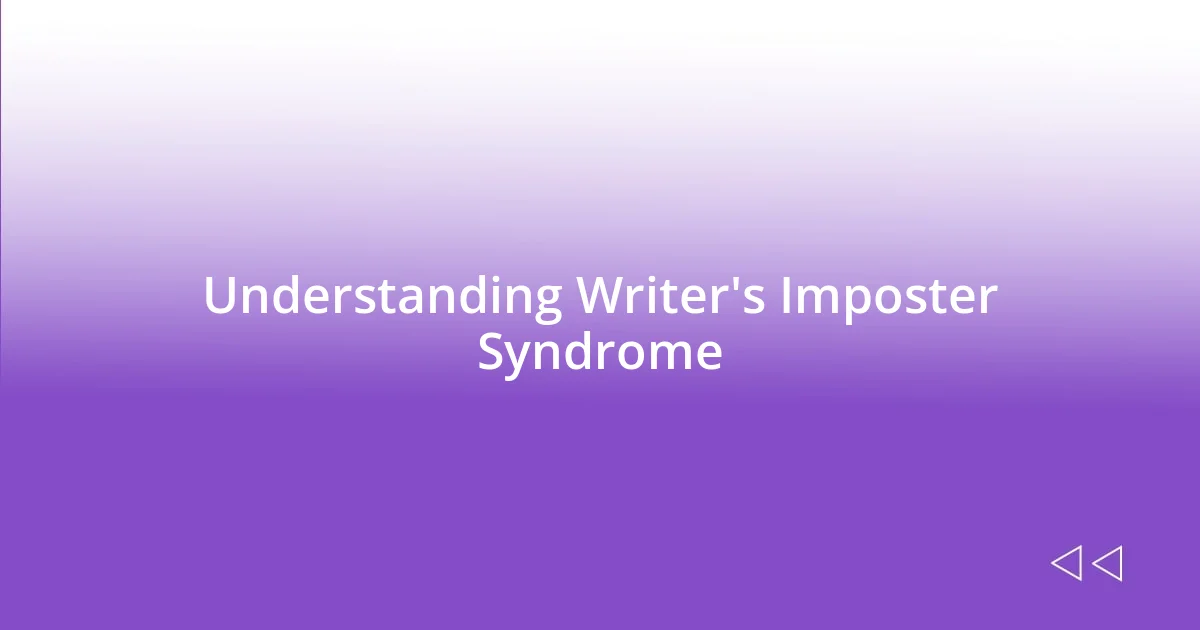
Understanding Writer’s Imposter Syndrome
Writer’s Imposter Syndrome is a sneaky little gremlin that can creep in whenever I sit down to create. It’s that sense of dread, that nagging doubt that I’m somehow less qualified than others to share my words. Each time I publish a piece, I often catch myself thinking, “What if they find out I’m just winging it?”
There have been moments when I’ve felt proud of my work, only to see someone else’s more polished piece and spiral into self-doubt. I’ve found myself comparing my rough drafts to their finished products, which is a slippery slope. It’s almost like staring at someone’s shining trophy while my dusty participation ribbon sits unnoticed on my desk. Why do we focus on others’ successes instead of celebrating our own journeys?
Sometimes, it feels like the words I write belong to someone smarter or more talented—a feeling that can be paralyzing. When I realized this wasn’t just me, but a common struggle among writers, it was both comforting and disheartening. Understanding that this sensation isn’t just a personal flaw but a widespread phenomenon helped me shift my perspective and embrace the journey rather than chase perfection.

Recognizing Your Feelings
Recognizing when those imposter feelings surface is crucial to overcoming them. I often notice this creeping unease right before sharing something I’ve written. It’s as if my brain shouts, “What are you doing? You’re not good enough!” This mental chatter can be relentless. Acknowledging these emotions is the first step I take; it allows me to confront them instead of letting them take charge.
- Pay attention to physical sensations: Do you feel a knot in your stomach or weight on your chest?
- Notice self-talk: Are you telling yourself you’re unqualified or that your ideas aren’t worth sharing?
- Reflect on comparisons: Are you measuring your worth against someone else’s achievements?
- Keep a feelings journal: Write down what you feel and when these feelings arise; it can offer clarity.
- Remind yourself of your accomplishments: Celebrate the steps you’ve taken to get where you are, however small they may seem.
I recall a specific instance when I wrote a piece that I was genuinely excited about. Yet, right before I hit publish, I felt a wave of nausea wash over me. In that moment, I forced myself to pause and recognize the emotion. I asked myself, “Is this fear rooted in fact, or is it just my mind playing tricks?” Taking a breath, I made the conscious choice to push through that discomfort, a small victory that reminded me of my capabilities.

Building a Support Network
Building a support network has been a transformative aspect of my writing journey. I can’t stress enough how valuable it is to connect with fellow writers who understand the challenges we face. When I reached out to a local writing group, I discovered a community that not only validated my feelings but also encouraged me to push through my self-doubt. Listening to others share their own struggles made me feel less isolated and reminded me that we’re all navigating similar storms.
Having trusted friends to give feedback on my work has also been incredibly beneficial. Last month, I shared a piece I was hesitant about with a close friend who is also a writer. Her encouraging words and insightful suggestions helped me see the potential in my writing that I initially couldn’t recognize. This experience reinforced the importance of surrounding myself with people who uplift and challenge me rather than contribute to my insecurities.
Creating a network is a combination of finding the right people and being open to sharing. While it might feel daunting at first, reaching out can lead to invaluable connections. I remember how nervous I was before posting in an online writer’s forum. To my surprise, the responses were overwhelmingly supportive. It’s in these interactions that I find perspective, motivation, and the courage to embrace my voice.
| Type of Support | Example |
|---|---|
| Writing Groups | Meeting regularly with peers to share ideas and experiences |
| Online Forums | Engaging with writers worldwide for feedback and camaraderie |
| Feedback Partners | Having a trusted friend review work before publication |
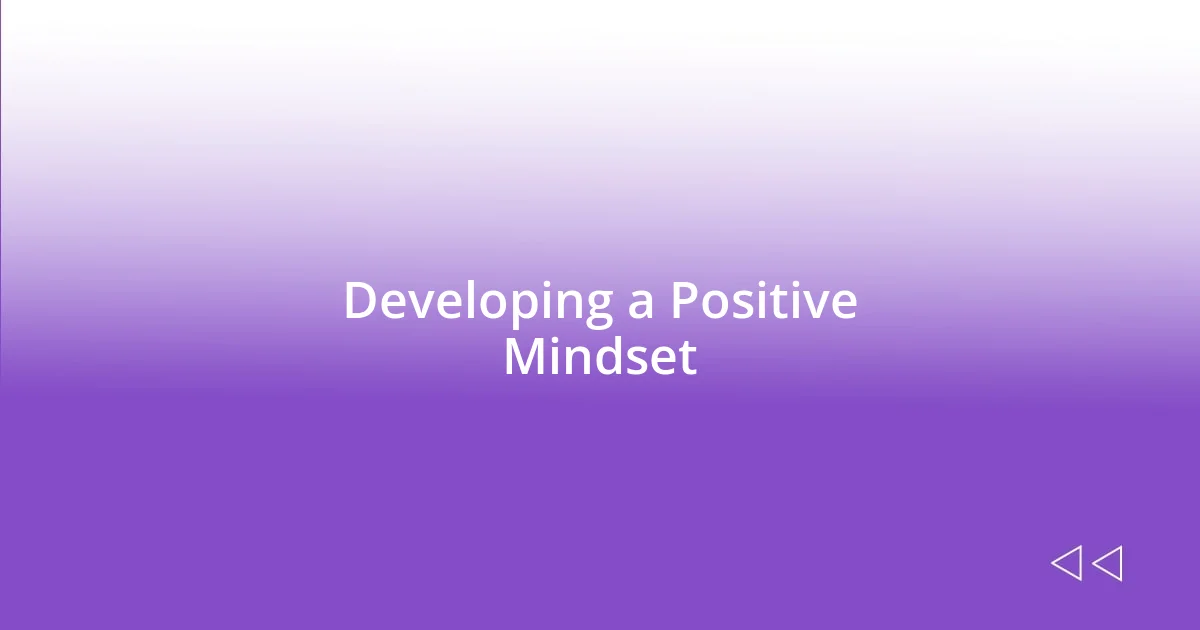
Developing a Positive Mindset
Developing a positive mindset is a game changer. I’ve learned that replacing negative thoughts with affirmations can make a significant difference. For instance, when I catch myself thinking, “I’m not a real writer,” I consciously switch it up to, “I am a storyteller, and my voice matters.” This simple shift not only lifts my spirits but also fuels my creativity.
On particularly tough days, I turn to gratitude exercises. I take a moment and jot down three things I’m thankful for in my writing journey. Whether it’s a kind comment on a blog post or just the sheer joy I feel when my pen glides across the page, these reflections remind me of my passion. It’s amazing how recognizing the bright spots can transform my outlook, helping me see that every writer has a unique path.
When I struggle with self-doubt, I often ask myself, “What advice would I give a friend in my position?” Reflecting on this question brings a sense of clarity. I realize that if I would lovingly encourage someone else, I should extend that same kindness to myself. Embracing this idea has not only fostered a supportive inner dialogue but also allowed me to pursue my writing endeavors with renewed confidence.
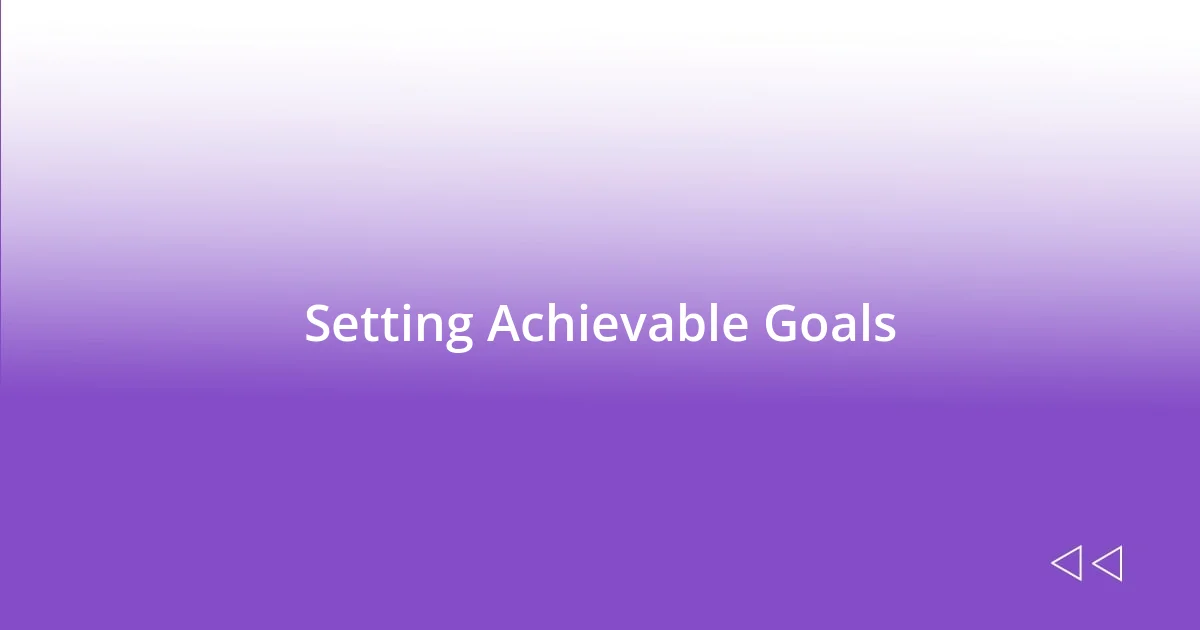
Setting Achievable Goals
Setting achievable goals is crucial in combating feelings of self-doubt. Early in my writing journey, I made the mistake of aiming too high, setting overly ambitious deadlines that often left me feeling overwhelmed. It wasn’t until I learned to break my projects into smaller, manageable tasks that I started to see real progress. For example, instead of telling myself I needed to finish an entire chapter in one day, I focused on writing just one paragraph or even a few sentences. This approach not only lessened the pressure but also rekindled my enthusiasm for writing.
I’ve also found that making my goals specific can be incredibly motivating. When I decided to write daily, I specified that I’d spend just 20 minutes every morning jotting down thoughts. Surprisingly, those short sessions led to bursts of inspiration that I never anticipated. I think about how I once felt guilty for not writing for hours, but dedicating even a small window of time not only eased that guilt but also carved out a space for creativity to flourish. Have you ever considered how a tiny commitment can lead to significant breakthroughs?
Reflecting on my experience, I realized that celebrating small wins is essential. After completing a goal, like finishing that one page, I take a moment to acknowledge my achievement. It’s shocking how a simple acknowledgment can shift my perspective. Instead of focusing on what remains to be done, I allow myself to bask in the joy of what I’ve accomplished. This practice nurtures a cycle of positivity, encouraging me to set more goals and reinforces the belief that I am indeed a writer.
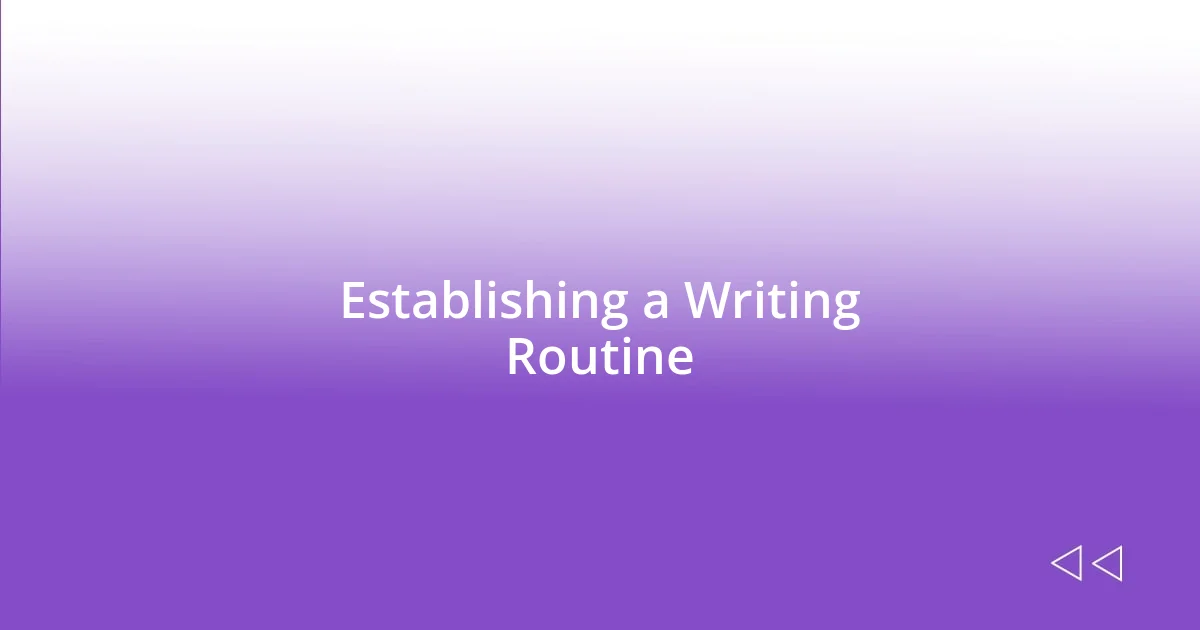
Establishing a Writing Routine
Establishing a writing routine can feel daunting, but I’ve come to realize how integral it is for my creative process. I remember when I first committed to writing every morning; it felt like a challenge. Yet, that consistency turned my chaotic thoughts into a structured flow, making my words easier to access. Isn’t it interesting how a simple routine can unlock creativity?
One practical adjustment I made was designating a specific spot in my home as my writing nook. This space, filled with inspiration boards and my favorite books, signals to my brain that it’s time to create. I’ve noticed that whenever I settle into that chair, my mind shifts gears. It leaves me wondering: how can the environment we create influence our ability to write?
I find that pairing my writing sessions with a cup of coffee or tea adds a comforting ritual to the process. Those moments when I cradle a warm mug in my hands feel peaceful, allowing me to focus better on the words flowing onto the page. Have you ever experienced the calming effect of a familiar routine? For me, it transforms writing from drudgery into something I genuinely look forward to each day.
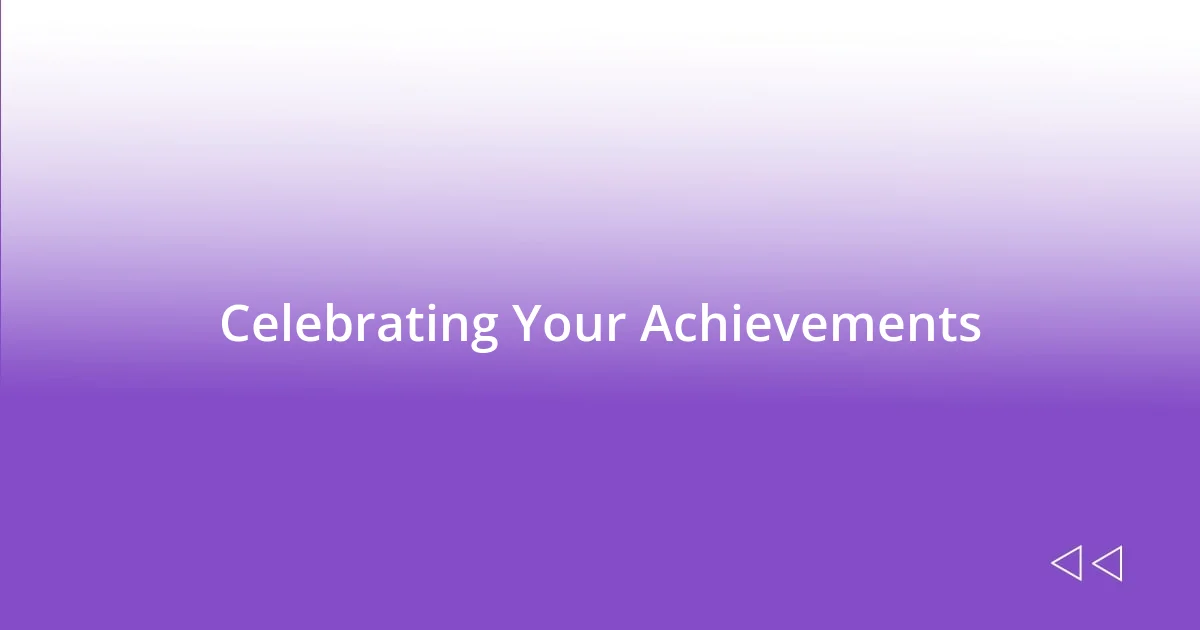
Celebrating Your Achievements
I can’t stress enough how powerful it is to celebrate your achievements, no matter how small they may seem. I remember the first time I shared my work in a writers’ group; I was terrified. But when I received positive feedback, it felt like a massive weight was lifted. Those little moments of recognition helped me internalize my progress, reminding me that I have something valuable to share. Have you ever experienced that rush of warmth when someone acknowledges your hard work? It can be a game-changer in how we perceive ourselves as writers.
Another practice I’ve adopted is creating a visual representation of my achievements. I’ve started keeping a “success journal” where I jot down milestones—like finishing a draft or completing a challenging section. Honestly, flipping through those pages is like taking a stroll down memory lane; it reinforces the belief that I’m capable. Isn’t it fascinating how physically seeing your progress can shift your mindset? This act of reflection helps combat feelings of inadequacy and breathing life into my journey as a writer.
I’ve also made it a point to celebrate my achievements with others. Whether it’s a simple call to a friend or a social media post, sharing my victories—big or small—adds an uplifting aspect to my writing journey. There’s something special about reconnecting with people who understand the struggle and joy of creation. Has sharing your accomplishments ever led to unexpected encouragement from others? I find that it not only boosts my confidence but fosters a supportive community—something essential in overcoming that pesky imposter syndrome.














